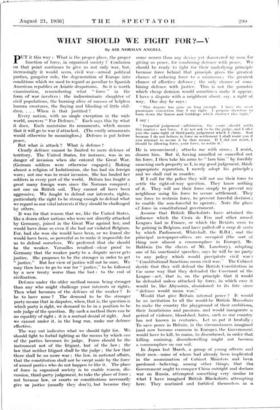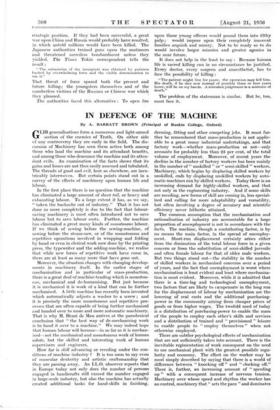WHAT SHOULD WE FIGHT FOR ? -\ By SIR NORMAN ANGELL
PUT it this way : What is the proper place, the proper function of force, in organised society ? Confusion on that point continues to give us not only war, but, increasingly it would seem, civil war—armed political parties, gangster rule, the degeneration of Europe into conditions which we used to regard as peculiar to Spanish American republics or Asiatic despotisms. So it is worth examination, remembering what " force " in the form of war involves : the indiscriminate slaughter of civil populations, the burning alive of masses of helpless human creatures, the flaying and blinding of little chil- dren. . . . When is that justified ?
Every nation, with no single exception in the wide world, answers " For Defence." Each says this by what it does. Each maintains its armaments, which means that it will go to war if attacked. (The costly armaments would otherwise be meaningless.) Defence is put before peace.
But what is attack ? What is defence ?
Clearly defence cannot be limited to mere defence of territory. The United States, for instance, was in no danger of invasion when she entered the Great War. (German soldiers were otherwise engaged.) Making almost a religion of Isolationism, she has had six foreign wars ; not one was to resist invasion. She has landed her soldiers in every part of the world. Britain has fought a great many foreign wars since the Norman conquest ; not one on British soil. They cannot all have been aggressive. We fought to defend our interests, rights, pazticularly the right to be strong enough to defend what we regard as our vital interests if they should be challenged by others.
It was for that reason that we, like the United States, like a dozen other nations who were not directly attacked by Germany, joined in the Great War against her, and would have done so even if she had not violated Belgium. For, had she won she would have been, or we feared she would have been, so powerful as to make it impossible for us to defend ourselves. We preferred that she should be the weaker. Versailles resulted—clear proof to Germany that the weaker party to a dispute never gets justice. She proposes to be the stronger in order to get " justice." But her view of justice will not be ours. We may then have to go to war for " justice," to be followed by a new treaty worse than the last : to the end of civilisation.
Defence under the older method means being stronger than any who might challenge your interests or rights. Then what becomes of the defence of the weaker ? Is he to have none ? The demand to be the stronger party means that in disputes, when, that is, the question is which party is right, we demand to be in a position to be sole judge of the question. By such a method there can be no equality of right ; it is a mutual denial of right. And we cannot under it, in the long run, make our defence effective.
The way out indicates what we should fight for. We 'should fight to forbid fighting as the means by which one of the parties becomes its judge. Force should be the instrument not of the litigant, but of the law ; the law that neither litigant shall be the judge ; the law that there shall be no more war ; the law, in national affairs, that the constitution shall not be swept aside by the force of armed parties who'do not happen to like it. The place of force in organised society is to enable reason, dis- cussion, third-party judgement, to take the place of force ; not because law, or courts or' constitutions necessarily give us justice (usually they don't), but because they come nearer than any device yet discovered by man for giving us peace, for combining defence with peace. We should be ready to fight for their underlying principle because force behind that principle gives the greatest chance of reducing force to a minimum ; the greatest chance of effective defence ; the only chance of com- bining defence with justice. This is not the paradox which cheap derision would sometimes make it appear. I have a dispute with a neighbour about, say. a right of way. One day he says :
" This dispute has gone on long enough. I have the most passionate conviction that I am right. I propose therefore to burn down the fences and buildings which obstruct this right."
I say : "Impartial judgement—arbitration. the court—should settle this matter ; not force. I do not ask to be the judge, and I offer you the same right of third-party judgement which I claim. And because I do not believe in force as settlement I shall resist 3-ou if you attempt to secure it by that means. If I did not resist, 1 should be allowing force, your force, to settle it."
Ile is unconvinced ; attacks me with arms ; I resist, disarm him. But if, having annulled or cancelled out his force, I then take his arms to " lam him " by forcibly annexing such property as I, in my good judgement, think appropriate reparation, I merely adopt his principle ; and we shall end in murder.
If 'I call for the police they will not use their force to settle the right-of-way question. They know nothing of • it. They will use their force simply to prevent my neighbour using his force to secure settlement. They use force to restrain force, to prevent forceful decision ; to enable the non-forceful to operate. Note the place of force in constitutional government.
Assume that British Blackshirts have attained the influence which the Croix de Feu and other armed Leagues had in France, or which the Rexists seem to be gaining in Belgium, and have pulled off a coup de main by which Parliament, Whitehall, the B.B.C. and the principal newspaper-offices are occupied (the sort of thing now almost a commonplace in Europe). Mr. Baldwin (to the cheers of Mr. Lansbury), adapting one of his sanctionist speeches, says he will he no party to any policy which would precipitate civil war : " Constitutional Sanctions mean civil war." The Cabinet decide that they will defend the British Constitution in the same way that they defended the Covenant of the League—act, that is, on the principle that it would be defended unless attacked by force, in which case it would be, like Abyssinia, abandoned to its fate since " defence would mean war."
Would that give Britain internal peace ? It would be an invitation to all the would-be British Mussolinis to make the country the playground of their ambitions, their fanaticisms and passions, and would inaugurate a period of violence, bloodshed, hates, such as our country has not known in centuries. Let us put it brutally : To save peace in Britain, in the circumstances imagined (and now become common in Europe), the Government would have to kill, to maim, to disembowel, in order that killing, maiming, disembowelling might not become a commonplace on our soil.
In Japan last March, a group of young officers and their men—some of whom. had already been implicated ' in the assassination of Cabinet Ministers and been pardoned—believing, among other things, that the Government ought to conquer China outright and declare war on Russia, attempted something very similar to what I have imagined British Blaekshirts attempting here. They mutinied and fortified themselves in a strategic position. If they had been successful, a great war upon China and Russia would probably have resulted, in which untold millions would have been killed. The Japanese authorities trained guns upon the mutineers and threatened merciless bombardment unless they yielded. The Times Tokio correspondent tells the result :
" The submission of the insurgents was obtained by patience hacked by overwhelming force and the visible determination to use it."
That threat of force spared both the present and future killing; the youngsters themselves and of the numberless victims of the Russian or Chinese war which they planned.
The authorities faced this alternative : To open fire upon those young officers would pound them into filthy pulp ; would impose upon their completely innocent families anguish and misery. Not to be ready so to do would involve larger miseries and greater agonies in the near future.
It does, not help in the least to say : Because lniman life is sacred killing can in no circumstance be justified. Every doctor, every surgeon and anaesthetist, has to face the possibility of killing :
"The patient might live for years; the operation may kill him. His death, if he dies now instead of possibly three or four years hence, will be on my hands. A mistaken judgement is =a- sentence of death."
The problem of the statesman is similar. But he, too, must face it.







































 Previous page
Previous page